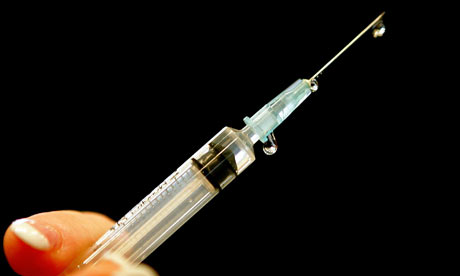Several studies suggest up to 60% of GPs would oppose being immunised because they are concerned the safety trials will be rushed

Half of GPs said they believe swine flu is too mild to justify taking a vaccine … a nurse prepares a syringe during a mass immunisation exercise at Bolton arena in 2006 to test procedures in case of a flu pandemic. Photograph: Martin Rickett/PA
Many GPs, as well as their patients, may be reluctant to be immunised against swine flu once a vaccine is developed, surveys suggest today.
A survey of GPs published on Healthcare Republic, the website of GP magazine, found that up to 60% of GPs may decline vaccination. Although the numbers who responded were small – 216 GPs – they are in line with a much bigger survey of nurses published a week ago by Nursing Times, which found that a third of 1,500 nurses would refuse vaccination.
A Canadian study published today in the journal Emerging Health Threats suggests the public, too, will have reservations that must be overcome if a vaccination campaign is to be successful in the autumn or winter. The study, which used focus groups to establish the likely response of different people to a vaccine, pointed to the need to win over people who believe that alternative therapies and a good diet are a better option than vaccines.
But the biggest problem in persuading people and healthcare professionals to have the jab may be the relative shortage of evidence from trials about its safety and efficacy. Because of the urgent need for a vaccine, testing will be limited.
Among the GPs who responded to the survey published by Healthcare Republic, 29% said they would not choose to have the vaccine and 29% said they were unsure whether or not they would.
The biggest reason given by those who said they would not have it was concern that the safety trials would not be adequate: 71.3% said they were "concerned that the vaccine has not yet been through sufficient trials to guarantee safety". Half – 50.4% – said they "believe that swine flu is too mild to justify taking the vaccine". Only 8.7% said they did not believe they were at risk.
Professor David Salisbury, director of immunisation for the Department of Health, commented on the website that frontline health workers have responsibilities to other people. "They have a duty to their patients not to infect their patients and they have a duty to their families," he said. "I think you solve those responsibilities by being vaccinated."
The Department of Health played down the results, saying that the small number of responders could not accurately be said to reflect the opinions of all GPs. But a spokesman added: "GPs will have an important role in the height of a pandemic. Getting the swine flu vaccine will protect them and their patients. That's why we're offering GPs the vaccine as a priority. Of course, vaccination will be optional, but the vaccine is being carefully assessed for safety and will be licensed before it is used."
Many of those questioned in focus groups for the study in Emerging Health Threats felt uneasy about vaccination for an illness perceived as mild. Others felt they could protect themselves through handwashing, keeping their distance from other people and even a good diet.
The survey results appeared as the department of health announced 14 new fast-tracked research projects into various aspects of swine flu, costing £2.25m. These include work to establish how long somebody with the virus is contagious and to establish the "safe distance" from a patient. Other projects will look at whether closing schools – which was the early response to the epidemic – stops spread and whether facemasks for healthcare workers are worthwhile.



No comments:
Post a Comment